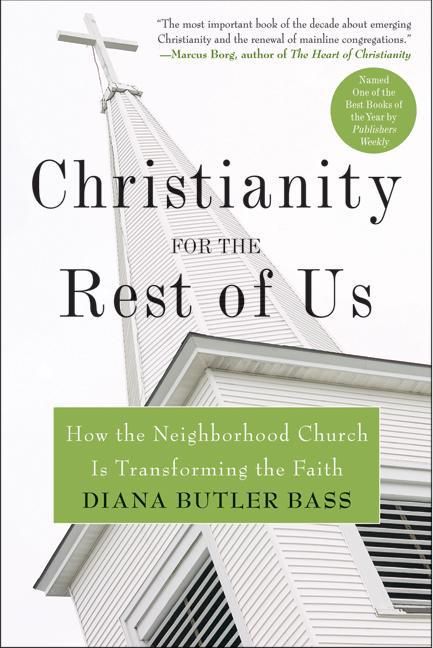transformation and tradition
Christianity for the Rest of Us: How the Neighborhood Church Is Transforming the Faith, by Diana Butler Bass.
 This subject is close to my heart and central to the needs of most of us in the protestant mainline. The study included ten core study congregations plus forty correlated validation churches spread across the continental United States, all of them what used to be generically referred to as mainline protestant, though these days that old once predictably socially, theologically and politically mainline has become sideline or spurline. The project combined participant observation, personal reflections from the book's author, from pastoral and lay church leaders and from rank and file members along with relatively hard data collection and crunching. Study churches "...were solid, healthy churches that exhibited Christian authenticity, expressed a coherent faith, and offered members ways of living with passion and purpose. They exuded a renewed sense of mission and identity, often having emerged from dire circumstances...they were their own best selves—creative and traditional, risktaking and grounded, confidence and humble, open and orthodox..." explains the introduction to the book. The Rest of Us means protestant - but definitely could include many Roman Catholics, too - Christians who don't affiliate or consider themselves fundamentalist or evangelical in the recently popular sense of "evangelical." The book jacket features a black and white sketch of a high-steepled, white wood frame church that's probably not the big downtown First or Central Church, but the drawing is similar to enough small town, suburban and small city meetinghouses that a lot of readers probably can identify.
This subject is close to my heart and central to the needs of most of us in the protestant mainline. The study included ten core study congregations plus forty correlated validation churches spread across the continental United States, all of them what used to be generically referred to as mainline protestant, though these days that old once predictably socially, theologically and politically mainline has become sideline or spurline. The project combined participant observation, personal reflections from the book's author, from pastoral and lay church leaders and from rank and file members along with relatively hard data collection and crunching. Study churches "...were solid, healthy churches that exhibited Christian authenticity, expressed a coherent faith, and offered members ways of living with passion and purpose. They exuded a renewed sense of mission and identity, often having emerged from dire circumstances...they were their own best selves—creative and traditional, risktaking and grounded, confidence and humble, open and orthodox..." explains the introduction to the book. The Rest of Us means protestant - but definitely could include many Roman Catholics, too - Christians who don't affiliate or consider themselves fundamentalist or evangelical in the recently popular sense of "evangelical." The book jacket features a black and white sketch of a high-steepled, white wood frame church that's probably not the big downtown First or Central Church, but the drawing is similar to enough small town, suburban and small city meetinghouses that a lot of readers probably can identify.Apparently there truly are such places as hospitable, creative and faithful churches where a person truly can belong, can grow, change and be transformed in every aspect of being in Jesus Christ!
The Galatian Church was the first of what we'd call an distinctively ethnic congregation, one gathered on the basis of genetic and cultural inheritance. As the author points out, in the U.S.A. the kind of village where everyone knew everyone and local church or denomination constituted on a basis of ethnic or cultural identity (think Scandinavian or German Lutherans, Scots Presbyterians, Italian, Irish or Polish Catholics who routinely intermixed and frequently confused symbols of culture and Christianity) went away just as nation and church have become ethnically, linguistically, racially and culturally diverse beyond anyone's anticipation, with many of us claiming more than one of each category.
I love the idea of people and groups being politically neither Blue nor Red but Purple, along with implications of early Christians adopting the royal color purple for radical, subversive usage and intent in seeking to follow The Way. In Acts 16:13-15 we hear about on the sabbath, expecting to "find a place of prayer" at the river, they also found a place for baptism, where people formally could separate from former allegiances and lords, and officially be baptized into the reign of heaven on earth under the Lordship of the crucified and risen Jesus Christ—a Lord at once both royal and subversive! Lydia, the first European Christian was a woman, and one who "dealt in" clothing for kings but dared publicly sign onto the subversive lifestyle of the followers of Jesus Christ. In that era of the original emerging church, Christianity provided a radically alternative perspective: politically to the point of sedition and socially to the extent of welcoming and actually including all comers. Lydia, newly-baptized and a merchant who routinely interacted with high and mighty royalty, knew God called her to hospitality and community. Let us consider what God is calling us to, wherever our social and cultural locations—assumptions, preferences and traditions?!
my amazon review: transformation and tradition

No comments:
Post a Comment
thanks for visiting—peace and hope to all of us!